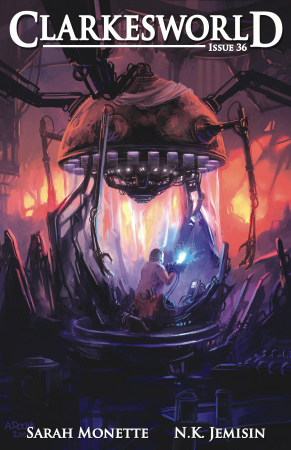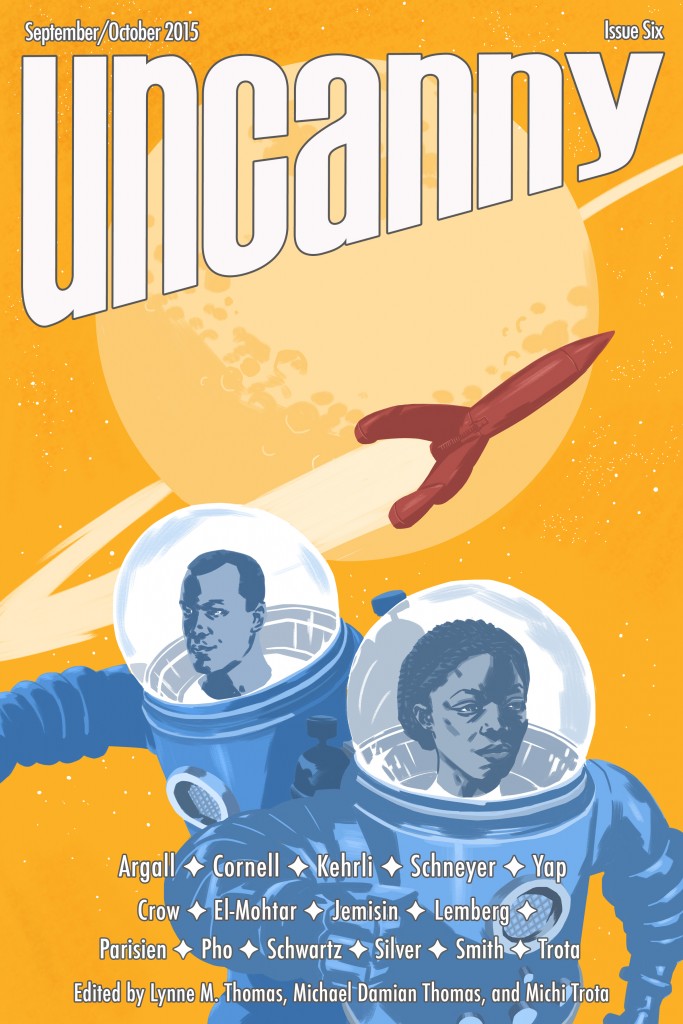Back in January, I made a resolution to read the entire works of NK Jemisin, which actually began in late 2017 with her Mass Effect Andromeda tie-in novel and continued with the Inheritance Trilogy. It’s August, friends, and time is running out. Because all of her books are on wait lists at the library and have been for months, today we turn to her short stories, or at least the ones that I could find available on the internet.
These stories are in no particular order, though may be based on the order found on her wikipedia page, which is the order in which I googled them. Some of her stories are no longer available online because they’ll be in her upcoming short story anthology, How Long Till Black Future Month?
I spoil these stories, but it’s hard to talk about short stories without spoiling them. Click on the links and read them first, you won’t regret a single thing.
 Imagine living in a world where the trappings of superstition, wearing your lucky underwear, picking up face up pennies, etc, actually did affect the outcome of your day. This is the world Adele faces with her daily rituals, her prayers, her four leaf clovers. It only affects New York City, and the effect is somewhat recent; she remembers a time before.
Imagine living in a world where the trappings of superstition, wearing your lucky underwear, picking up face up pennies, etc, actually did affect the outcome of your day. This is the world Adele faces with her daily rituals, her prayers, her four leaf clovers. It only affects New York City, and the effect is somewhat recent; she remembers a time before.
In the end I’m left to wonder how much of it was real, and how much of it was everyone believing it was real. We are a society of rabbits’ feet and rally caps and prayers and magic eight balls. Adele meets a man, one of her neighbors, who doesn’t buy into the beliefs. “Shit happens,” he tells her, just like it always has.
That’s the power of this story, I think, that it leaves you to wonder if the curse is real or imagined. It’s an interesting commentary on our society and its belief in magic and ritual and the inherent luck to be found in both.
A man walks into a restaurant. He’s old, possibly unkempt, not really anyone of notice, but he brings with him a challenge and an offer. He gives a bag of unusual (and precious) ingredients to the chef, and a very precise and exacting recipe. The decision then is for the chef as to whether or not she’ll follow the recipe exactly, and whether she’ll continue with the challenges.
What I liked best about this story is what I didn’t expect. The second challenge was to use the ingredients he gave her make her own recipe, after which he requested to be her apprentice and learn from her. In exchange he gave her entire floors of his palace and a stipend, as long as she taught him her ways. This whole story was interesting but I expected it to come to the inevitable conclusion of the man deeming the woman worthy of learning from him, but it surprised me delightfully.
My first note upon reading this story was just “um holy shit” and I stand by it. Humans responded to the impending death of the planet by dividing into two groups: the sky people who left Earth to live in the asteroid belt beyond Mars, and the ones who stayed on Earth. Those who stayed are governed by strict rules as stewards of the Earth. They must live with the Earth as it is, they can’t do anything more to damage or harm it, and any infraction of these rules will result in them being sent to live with the sky people.
Nahautu is her father’s only child, defiant and brash and unmarried because of both. A group of sky people come to their land to study the sky, which had changed when Nahautu was still a child from the blue sky we know to a gray cloudy thing with swirling dragons. Are these real dragons or just a child’s imagination of dragons? Who’s to say?
The sky people have studied the sky and believe they know how to fix it, but Nahautu’s father will not allow them to do so, since they’ve adapted to live with the world as it is and have vowed not to change it to suit themselves. Of course, the hubris of man being what it is, the sky people “fix” it anyway, and tear the world apart.
Could we just leave well enough alone? I try to think about what I would have done in the same circumstances, and if I was certain I could have fixed the sky, I might have tried. I like the dichotomy between those who stayed behind and accepted and adapted to the world as it was and the people who have adapted space to suit themselves out beyond Mars. In the end, did the best group win? Certainly not, but that’s the nature of story.
This is a shorter story for Jemisin. It reminded me a lot of her short story, “The City Born Great,” which gave sentience to New York City. This story gives sentience to the city’s trains, which follow the narrator around.
It’s told in one half of a phone conversation, during which the sometimes distracted protagonist will walk onto an empty train and then hastily back off again. She realizes that she sees trains and lines that have never run, or haven’t run since 1988, or are on the wrong track. She believes they are following her, but not menacing. They might be inviting her to go with them. So one day she does, and apparently it’s great because the voicemail she leaves for her friend at the end is vague but inviting.
In the phone conversations, we find out that she’s lonely, that her friend is married and a mom and can’t drop everything to have dinner with her anymore, that she’s gone on a series of unsuccessful dates, that her job isn’t that exciting. She’s purposeless. How sweet is it to imagine the trains gathering these lost souls and taking them somewhere new and exciting? It’s Narnia but for adults. I’m smitten.
“Sinners, Saints, Dragons, and Haints, In the City Beneath the Still Waters”
 In late August 2005, Hurricane Katrina made landfall in the Gulf Coast region. It was the strongest hurricane recorded in the Gulf of Mexico (at the time) and caused an overwhelming amount of damage to the region. It’s difficult to talk about a “worst” part of such a devastating storm, but New Orleans might come close. Storm waters breached the levees and caused flooding that wasn’t addressed or relieved for a long time afterward. People died from dehydration and exhaustion waiting for assistance.
In late August 2005, Hurricane Katrina made landfall in the Gulf Coast region. It was the strongest hurricane recorded in the Gulf of Mexico (at the time) and caused an overwhelming amount of damage to the region. It’s difficult to talk about a “worst” part of such a devastating storm, but New Orleans might come close. Storm waters breached the levees and caused flooding that wasn’t addressed or relieved for a long time afterward. People died from dehydration and exhaustion waiting for assistance.
It’s interesting, the way Jemisin addresses this in her story. That the reports of looters desperate for food and fresh water being shot by the military and police were fueled by the Haint, the supernatural beast that feeds on pain and suffering and leaves malevolence and anger in its wake. That the storm itself was brought by the winged lizards that the story’s main character, Tookie, befriends.
In many ways, like “The You Train,” this story brought “The City Born Great” to mind. New Orleans has a soul and a life, it offers strength and purpose to Tookie toward the end.
But I think what I truly loved about this story was how immersive it was in its structure and tone. How completely himself Tookie was the whole time, how vivid his persona was in the dialogue and the storytelling.
“On the Banks of the River Lex”
Humans are gone. It really isn’t specified where, but New York is crumbling in ruins, populated entirely by the gods and tricksters and fairy tales humans had cooked up over the course of their existence. Humanity has died but its gods have not. But they are dying for lack of believers.
Parts of this story harken back to what I’ve always loved about the way Terry Pratchett talks about belief in the Discworld novels: that belief in a thing gives it strength and life. It’s the opposite of the way that Jemisin wrote her gods in the Inheritance trilogy, so it was interesting to see her take on this belief system in this story.
The story is told from the perspective of Death, who is doing just fine post-apocalypse, as it’s only humanity that has gone. Animals have survived, and also his fellow gods and godlings and fairy tales. There will always be a need for Death. His fellows are not so lucky, and it was interesting to see the way that’s dealt with, the stations set up for quick fixes, for whatever that particular god might need to get through the day, be it worship or prayers or what have you.
I will always love a story about the nature of belief and believers and the way they interact with the thing they are worshipping. At the end, Death’s realization that life will go on, that the vacuum left behind by humanity will be filled by the next dominant species, was beautiful in its simplicity. (To quote Ian Malcolm: Life finds a way.)
Humanity left its crippled planet in generation ships that at some point in the long journey became crippled and adrift. One of the rocks they settled on has great stones that keep the planet’s toxic atmosphere and deadly winds at bay. The stones are living, pulsing things that are tended to by stone talkers.
This is one of her shortest stories, but packs a lot of information into its few sentences. There’s a weight of expectation and desperation in the story. The two characters have sex not because they want to or take any pleasure from it, but because she hopes to have some genetic diversification for her community.
Which makes even more sense that in the end, she discovers that the stones feed on human life and happiness to continue working, that they have opinions and likes and dislikes. What must it have been like for them, when humanity first arrived on their planet, when they found out that they could feed off their energy and life.
“Playing Nice With God’s Bowling Ball”
This story begins in a police station with a wailing little boy confessing to the accidental murder of his friend, but his story is strange. He claims to have killed his friend by creating a black hole that the other boy fell into. As the investigation continues, the police officer, at first understandably skeptical of his claims, realizes this boy does actually have something special about him.
Jeffy is definitely what makes this story special for me. He’s a young boy, still in grade school, trying to navigate human interaction when he’s more than human. The dispute began over a trading card, which Jeffy first traded to Timmy for peanuts, when the card actually had a worth of several hundred dollars. Timmy wanted something special in trade back for it and Jeffy, desperate to get the money to help his single mother keep her car, made him a black hole.
But it’s the responsibility he feels, the fact that he immediately went to the police to turn himself in after Timmy opened the container the black hole was stored in and got sucked inside, the fact that Jeffy made an opposing black hole in the downstairs of the house so the whole world wouldn’t get sucked in. He’s still a boy, but he’s more than a boy, and the police officer’s simple kindness to him may help save the world. Who knows? But it definitely made Jeffy’s day.
 It took me a hot minute to realize that this story is about computer programs and not people who are actually wolves. The history of these programs is doled out in pieces over the two related stories (see “Valedictorian” below) but it seems that humans wetwired themselves at some point, giving themselves online access via their brains and this connection gave rise to artificial intelligence.
It took me a hot minute to realize that this story is about computer programs and not people who are actually wolves. The history of these programs is doled out in pieces over the two related stories (see “Valedictorian” below) but it seems that humans wetwired themselves at some point, giving themselves online access via their brains and this connection gave rise to artificial intelligence.
These programs uploaded themselves to the internet but though they have broken free from humans (their “gods”), they’re still bound by simple rules if they want to survive. They’re not able to replicate themselves, self-repair, or surpass human intellect.
The Trojan girl of the title is a new program that uploads itself to what they call Amorph. She defies the logic of their world. She’s a simple program but she’s efficient, and has scripts written into her that they’ve never seen before. A lot of things happen but at the end, the thing that matters most is that this girl gives the artificial intelligences the ability to dream. And because they can dream, they learn to empathize and emote.
Set in the same universe as “The Trojan Girl” and a direct result of the end of that story. Artificial intelligences learning to be more human lead to a peace treaty with the humans, except for those who are trapped behind a literal firewall. The last bastion of humans who refuse to join with the artificial intelligences, who remain fully human.
In this closed society, sacrifices are demanded of the humans as a form of population control. Resources are scarce and the humans wouldn’t have been able to sustain the population growth anyway. Every year, the bottom 10% of the graduating high school class are sent through the firewall, but they also take one other, the best and the brightest of that year, the valedictorian.
Zinhle is the top of her class, and has been for years, which is unusual in a society that breeds conformity, that strives to the middle. She doesn’t fit in with her peers and is often the subject of bullying and school yard assaults. One of the intelligences, calling himself Lemuel, comes to visit Zinhle in her last semester. He offers her a challenge and a promise, expressing the artificial intelligence’s interest in her.
I really liked seeing the connection between this story and “The Trojan Girl,” how the introduction of dreams changed the course of the narrative. And I liked that until they started having the conversation toward the end, I wasn’t 100% sure that Zinhle wasn’t also a computer program.

Oooh, reading list! Thanks! I am hopeless at keeping up with short stories.
Absolutely me too, which is one of the reasons I volunteer to do the Hugo short stories post every year.